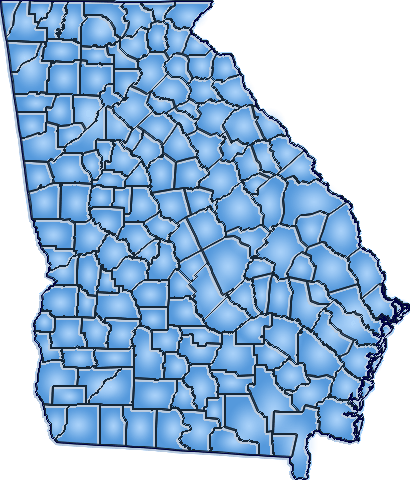Stewart County vs. Georgia Comparative Trends Analysis: Total Personal Income Growth and Change, 1969-2022 Introduction  Stewart County: 2022 TPI = $165,777K 2022 Percent of State = 0.03% Georgia: 2022 TPI = $617,552,988K 2022 Percent of U.S. = 2.83% The annual total personal incomes (TPI) estimates compiled by the Bureau of Economic Analysis, (BEA) are among the most comprehensive, consistent, comparable and timely measures of economic activity available statewide and at the national levels. Personal income estimates are also the best available local level indicator of general purchasing power, and are therefore central to tracking and comparing county patterns of economic growth and change. The following graphs highlight trends in the pattern of growth and change in the total personal income of Stewart County and Georgia with comparison to the nation. The data used are those compiled by the Regional Income and Product Divisions of the Bureau of Economic Analysis, U.S. Department of Commerce. The 2017 constant dollar (real) estimates of total personal income reported in the tables and portrayed graphically below are determined using the Implicit Price Deflator for Personal Consumption. Data Definition: Personal income is the income received by persons from participation in production, plus transfer receipts from government and business, plus government interest (which is treated like a transfer receipt). It is defined as the sum of wages and salaries, supplements to wages and salaries, proprietors' income with inventory valuation and capital consumption adjustments, rental income of persons with capital consumption adjustment, personal dividend income, personal interest income, and personal current transfer receipts, less contributions for government social insurance. Because the personal income of an area represents the income that is received by, or on behalf of, all the persons who live in that area, and because the estimates of some components of personal income (wages and salaries, supplements to wages and salaries, and contributions for government social insurance) are made on a place-of-work basis, state personal income includes an adjustment for residence. The residence adjustment represents the net flow of compensation (less contributions for government social insurance) of interstate commuters. Stewart County Total Personal Income, 1970-2022 Current vs. Constant Dollars (Millions)  Figure 1. Figure 1 depicts Stewart County's annual total personal income over 1970-2022 in current and constant (2017) dollars. Constant dollar measurements remove the effects of inflation. They allow for comparison of changes in the real purchasing power of Stewart County over time. When measured in current dollars, Stewart County's total personal income increased 885.89%, from $17M in 1970 to $166M in 2022. When measured in constant 2017 dollars to adjust for inflation, it advanced 67.93%, from $85M in 1970 to $143M in 2022. Real Total Personal Income, 1969-2022 (Millions)  Figure 2. Figure 2 traces Stewart County's and Georgia's annual real total personal income for the period 1969-2022 to illustrate real total personal income patterns over time. During this 54-year period, Stewart County's real total personal income rose from $87M in 1969 to $143M in 2022, for a net gain of $56M, or 65.14%. In comparison, Georgia's real total personal income advanced from $79,331M in 1969 to $532,176M in 2022, for a net gain of $452,845M, or 570.83%. Real Total Personal Income Indices (1969=100): 1969-2022  Figure 3. Figure 3 portrays Stewart County's real total personal income growth in a broader context by offering direct comparisons across time with Georgia, the United States. The growth indices shown here express each region's real total personal income in 1969 as a base figure of 100, and the real total personal incomes in later years as a percentage of the 1969 base figure. This method allows for more direct comparison of differences in real total personal income growth between regions that may differ vastly in size. Stewart County's overall real total personal income growth was 65.14% over 1969-2022 trailed Georgia's increase of 570.83%, and fell below the United States' increase of 348.76%. Total Personal Income as a Percent of the Georgia Total: 1969-2022  Figure 4. Another interesting and insightful way of contrasting the total personal income growth of Stewart County is to compare its individual percentage contributions to Georgia's statewide total personal income over time, as shown in Figure 4. A rising share means a region's total personal income grew faster, or declined less, than Georgia's total personal income, while a declining share shows it grew more slowly. In 1969, Stewart County's total personal income comprised 0.11% of Georgia's total personal income, while in 2022 it equated to 0.03% thereby yielding a -0.08% share-shift.
Stewart County Real Total Personal Income: Annual Percent Change, 1970-2022  Figure 5. Figure 5 displays the short-run pattern of Stewart County's real total personal income growth by tracking the year-to-year percent change over 1970-2022. The average annual percent change for the entire 53-year period is also illustrated on this chart to provide a benchmark for gauging periods of relative high--and relative low--growth against the backdrop of the long-term average. On average, Stewart County's real total personal income grew at an annual rate of 1.04% over 1970-2022. The county posted its highest growth in 1984 (12.14%) and posted its lowest growth in 1974 (-8.84%). In 2022, Stewart County's real total personal income declined by -4.35% Stewart County Real Total Personal Income: Annual Percent Change and Decade Averages Over 1970-2022  Figure 6. Over the past five decades some counties have experienced extreme swings in growth, and often such swings have tended to coincide with the decades themselves. Figure 6 again illustrates the annual percent change in Stewart County's real total personal income since 1970, but this time they are displayed with average growth rates for the decade of the 1970s, 1980s, 1990s, 2000s, 2010s, and 2020-2022. During the 1970s, Stewart County's annual real total personal income growth rate averaged 0.47%. It averaged 2.27% throughout the 1980s, 2.48% in the 1990s, -1.31% throughout the 2000s, 1.71% throughout the 2010s, -0.29% thus far this decade (2020-2022). Real Total Personal Income Growth: Average Annual Percent Change by Decade  Figure 7. Figure 7 compares the decade average growth rates for Stewart County noted in the previous graph with the corresponding decade averages for Georgia and the nation. As the chart reveals, Stewart County's average annual real total personal income growth fell below Georgia's average in the 1970s (0.47% vs. 4.30%), trailed Georgia's average during the 1980s (2.27% vs. 4.66%), fell below Georgia's average throughout the 1990s (2.48% vs. 4.85%), recorded under Georgia's average throughout the 2000s (-1.31% vs. 2.02%), posted below Georgia's average in the 2010s (1.71% vs. 3.05%), and trailed Georgia's average over the 3 year period of the current decade, 2020-2022 (-0.29% vs. 2.28%). Finally, relative to nationwide real total personal income growth trends, Stewart County fell under the nation throughout the 1970s (0.47% vs. 3.50%), lagged the nation during the 1980s (2.27% vs. 3.16%), lagged the nation during the 1990s (2.48% vs. 3.27%), recorded underneath the nation in the 2000s (-1.31% vs. 2.06%), posted below the nation in the 2010s (1.71% vs. 2.72%), and posted below the nation over 2020-2022 (-0.29% vs. 2.10%).
| Analysis Options Menu | ||||||||||||||||||||||||||||||||||||||||||||||||||||||||||||||||||||||||||||||||||||||||||||||||||||||||||||||||||||||||||||||||||||||||||||||||||||||||||||||||||||||||||||||||||||||||||||||||||||||||||||||||||||||||||||||||||||||||||||||||||||||||||||||||||||||||||||||||||||||||||||||||||||||||||||||||||||||||||||||||||||||||||||||||||||||||||||||||||||||||||||||||||||||||||||||||||||||||||||||||||||||||||||||||||||||||||||||||||||||||||||||||||||||||||||||||||||||||||||||||||||||||||||||||||||||||||||||||||||||||||||||||||||||||||||||||||||||||||||||||||||||||||||||||||||||||||||||||||||||||||||||||||||||||||||||||||||||||||||||||||||||||||||||||||||||||||||||||||||||||||||||||||||||||||||||||||||||||||||||||||||||||||||||||||||||||||||||||||||||||||||||||||||||||||||||||||||||||||||||||||||||||||||||||||||||||||||||||||||||||||||||||||||||||||||||||||||||||||||||||||||||||||||||||||||||||||||||||||||||||||||||||||||||||||||||||||||||||||||||||||||||||||||||||||||||||||||||||||||||

